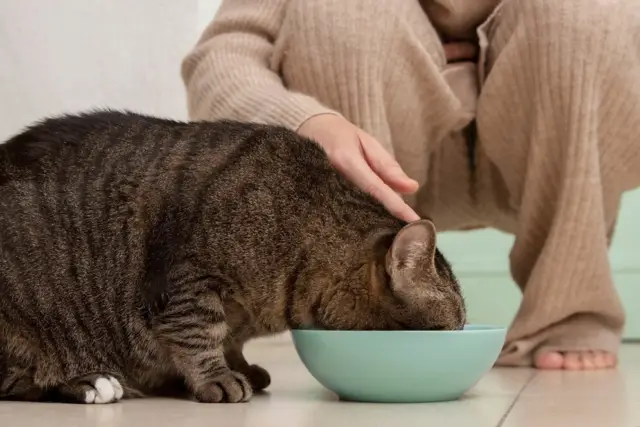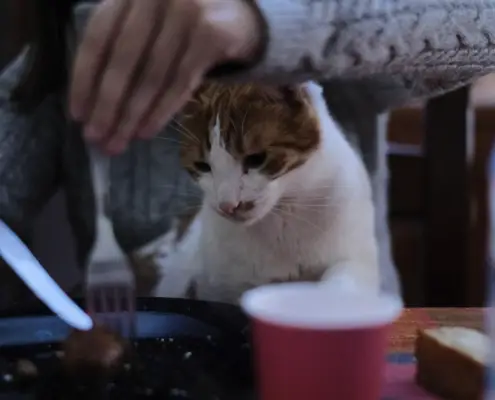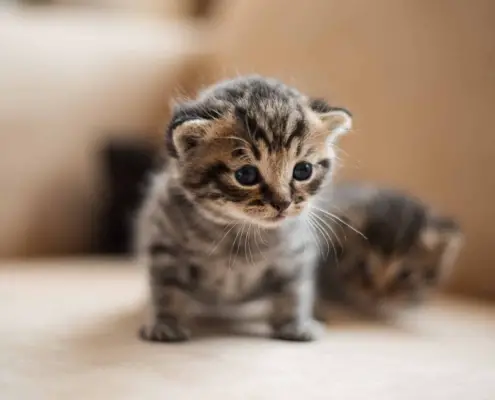
Maintaining a healthy weight is crucial for the overall well-being of your feline friend. Just like humans, cats can suffer from obesity, which can lead to various health issues. Obesity in cats can increase the risk of diabetes, heart disease, arthritis, and even reduce their lifespan. Therefore, it is essential for cat owners to understand the importance of weight control for their furry companions.
Common causes of weight gain in cats
There are several factors that can contribute to weight gain in cats. One common cause is overfeeding. Many cat owners tend to provide their pets with too much food, leading to excess calorie intake. Additionally, feeding cats a diet high in carbohydrates can also contribute to weight gain. Lack of exercise is another significant factor. Cats that live a sedentary lifestyle are more prone to weight gain. Hormonal imbalances, such as hypothyroidism, can also cause weight gain in cats.
The risks of obesity in cats
Obesity in cats can have serious consequences on their health. Excess weight puts strain on their joints, making them more susceptible to arthritis. It can also lead to diabetes, as overweight cats have a higher risk of developing insulin resistance. Heart disease is another risk associated with obesity in cats. The extra weight can put pressure on the heart, leading to hypertension and other cardiovascular issues. Obesity can also impact a cat’s quality of life, making it difficult for them to move and play.
How to determine if your cat is overweight
It is important to be able to identify if your cat is overweight. One way to determine this is by examining their body shape. A healthy cat should have a visible waistline when viewed from above and a slight tummy tuck when viewed from the side. If your cat lacks these features and has a rounder, bulging abdomen, they may be overweight. Another method is to feel their ribs. You should be able to feel them easily without pressing too hard. If you have trouble feeling the ribs due to a layer of fat, it is a sign that your cat may be overweight.
Creating a weight loss plan for your cat
If you determine that your cat is overweight, it is crucial to create a weight loss plan for them. Consult with your veterinarian to design a suitable plan based on your cat’s specific needs. The weight loss plan may include dietary changes, exercise routines, and regular monitoring. It is important to note that weight loss should be gradual, as rapid weight loss can be harmful to your cat’s health.
Feeding guidelines for weight control in cats
When it comes to feeding your overweight cat, it is important to follow specific guidelines to control their weight. Your veterinarian may recommend a prescription weight loss diet that is specifically formulated to help cats shed extra pounds. These diets are usually low in calories and high in protein to keep your cat feeling full and satisfied. It is important to measure the food accurately and avoid free-feeding, as portion control is crucial for weight control. Additionally, avoid giving your cat treats or table scraps, as these can contribute to weight gain.
Recommended exercises for cats to maintain a healthy weight
Regular exercise is essential for cats to maintain a healthy weight. Engaging your cat in play sessions can help them burn calories and stay active. Use interactive toys such as feather wands or laser pointers to stimulate their natural hunting instincts. Set aside dedicated playtime each day to ensure your cat gets enough exercise. Additionally, providing scratching posts and climbing trees can encourage physical activity. Consider investing in puzzle feeders or treat-dispensing toys to make mealtime more engaging and mentally stimulating for your cat.
Monitoring your cat’s progress and adjusting their weight loss plan
Regular monitoring is crucial to track your cat’s progress and make any necessary adjustments to their weight loss plan. Weigh your cat regularly to keep track of their weight loss. If their weight is not decreasing as expected, consult with your veterinarian to determine if any modifications are necessary. It is also important to monitor their body condition. As your cat loses weight, their body shape should gradually become more defined, with a visible waistline and ribs that are easily felt.
Additional tips for successful weight control in cats
In addition to a weight loss plan and regular exercise, there are a few additional tips that can help in successful weight control for cats. Provide fresh water at all times to keep your cat hydrated. Avoid leaving food out overnight, as it can lead to mindless eating. If you have multiple cats, feed them separately to ensure each cat consumes the appropriate amount of food. Lastly, be patient and consistent with your cat’s weight loss journey. It may take time to achieve the desired weight, but with dedication, you can help your feline friend achieve a healthy weight.
The benefits of achieving a healthy weight for your feline friend
Achieving and maintaining a healthy weight for your cat is essential for their overall health and well-being. By understanding the importance of weight control, identifying the common causes of weight gain, and implementing a weight loss plan, you can help your cat live a longer and happier life. Remember to consult with your veterinarian for guidance and support throughout the process. With proper nutrition, regular exercise, and monitoring, you can ensure that your feline friend enjoys the benefits of a healthy weight.
Schedule a visit with your veterinarian today to discuss your cat’s weight control plan and start them on the path to a healthier life.
If you enjoyed my article, I would appreciate you sharing it with your network.

Sima Ndlebe
Sima writes for CatBuzz. He is interested in Cats, Health and Fitness, and Entrepreneurship.
Published: 11 October 2023
Related Articles
Disclaimer
The content found on CatBuzz.org is presented on an "as is" basis and is intended for general consumer information and education purposes only. Any utilization of this information is voluntary and solely at the user's own risk.
None of the articles or content should be regarded as, or used in place of, veterinary medical advice, diagnosis, or treatment. The information provided on the website is purely for educational and informational intentions and should not be considered a substitute for professional guidance from a veterinarian or other qualified expert. The articles are designed to inform consumers about veterinary healthcare and medical matters that may impact their cat's daily life. It should be noted that this website and its services do not constitute the practice of any form of veterinary medical advice, diagnosis, or treatment. CatBuzz.org explicitly disclaims any liability for any direct or indirect damages or losses that may arise from the use of or reliance on the information contained within the content.
Consumers must consult a veterinarian, veterinary specialist, or another qualified veterinary healthcare provider when seeking advice regarding their cat's health or medical conditions. It is important not to ignore, avoid, or postpone seeking medical advice from a veterinarian or other qualified veterinary healthcare provider solely based on information obtained from this website. If you believe that your cat may be experiencing a medical issue or condition, it is imperative to promptly contact a qualified veterinary healthcare professional.



